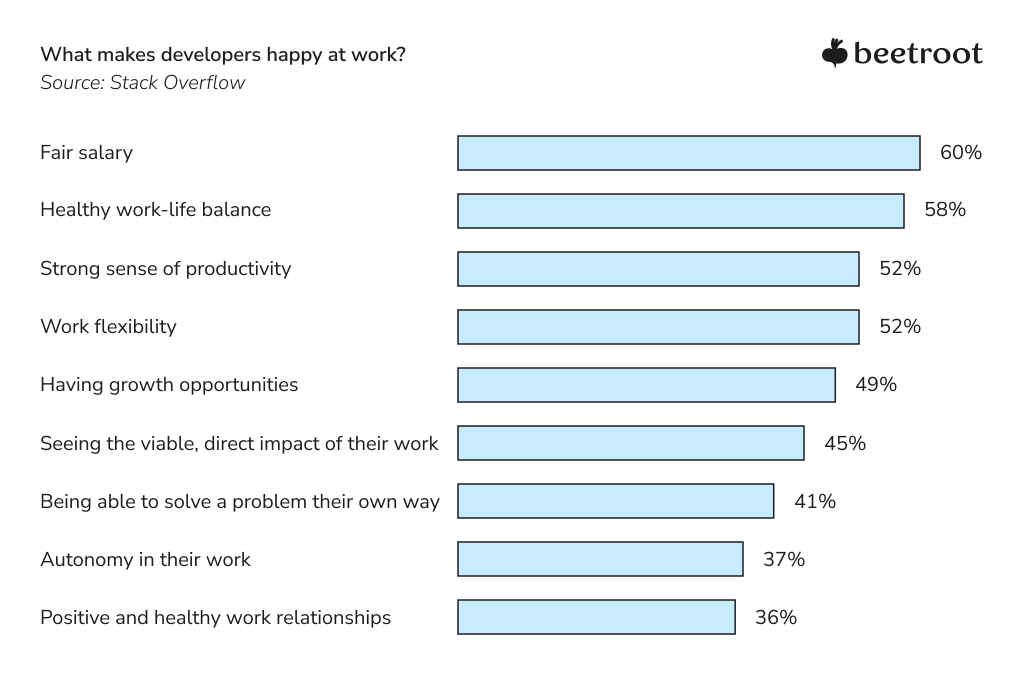
The Well-Being Code: Are Your Developers Happy at Work?
Contents
Contents
Is your company a fulfilling place to work? Many tech leaders are pondering this question, considering the recent “Great Resignation” trend of people actively leaving their jobs in search of better luck. However, regarding software engineering, surveys consistently indicate high levels of developer happiness. Autonomy, pay, flexibility, and overall well-being contribute to software development ranking among the top jobs, even becoming the best job in America in 2023. Despite the inherent stress of the profession, software engineers seem to be a happy population.
While some may attribute the high job satisfaction among devs to the desire for career advancement and higher paychecks, there must be more to it. So let’s put our Sherlock hats on and explore what truly makes a workplace fulfilling for software developers.
What is developer happiness?
It may sound cliché, but developers are happiest when they feel content and satisfied with their coding work, just like a painter who is delighted when colors blend harmoniously or a musician passionate about a perfect melody. As in any other creative activity, this goes beyond mere job satisfaction and delves into the realms of joy, enthusiasm, and a sense of purpose. Happy developers tend to be more productive and motivated to stay longer with a company.
But, on the other hand, we cannot oversee the challenges such as lack of diversity in the industry, non-technical management (cue typical office jokes), stressful situations, frequent extended hours, and constant learning that some might find exhausting. So, what are the critical factors that can bring back the balance?
The key drivers of developer happiness
We’ve extracted the most interesting findings of a landmark Stack Overflow study and illustrated them in the infographic below:

As it turns out, salary, work-life balance, flexibility, productivity, and growth opportunities are all key factors that determine the happiness and satisfaction of developers at work. Conversely, unhappiness can lead to burnout, affect creativity, and problem-solving, decrease productivity, and hang a dark cloud over team dynamics.
Unhappiness in development teams can also take a financial toll on companies. High turnover rates mean increased recruitment and training expenses. Additionally, low employee satisfaction can make it hard to attract top talent. Unhappy developers can negatively influence team morale, which can spread and lead to conflicts. Ultimately, this can make entire teams or departments less effective, making it harder for the company to deliver successful software products.
Developers may be down in the dumps for many reasons, such as heavy workload, lack of recognition, poor organizational culture, inadequate work-life balance, limited autonomy, and insufficient tools. So leaders can enhance productivity and improve team performance by focusing on strategies to improve developer happiness.
Healthy work environment and autonomy
As highlighted by yet another study, 75% of developers consider work-life balance “very important” regardless of experience, age, gender, position, or region. Therefore, companies should empower developers to work within their designated hours and establish efficient workflows that minimize unnecessary downtime and unproductive communication.
It ultimately leads to a healthier and happier workplace. As a leader, you have an excellent opportunity to create a supportive environment that promotes well-being and satisfaction, where everyone can pursue their interests and hobbies outside of work and feel more motivated and less stressed to return the next workday.
“We continuously observe that an opportunity for our team members to fuel their various skills and personality traits into their work contributes to their general happiness in a greater amplitude than a dry balancing of working and non-working hours. Therefore, we’ve reflected that in Beetroot’s value code as wholeness — bring your whole self to work.”
— Beetroot Culture
Ensuring a sustainable approach to work that prioritizes mental well-being is crucial for avoiding team burnout. Not only does it benefit individuals but also the team’s overall success. A positive work environment where developers feel physically and mentally safe is vital in fostering this mindset. By creating a great developer experience, teams can avoid disputes and work drama, streamlining processes and technology to support collaboration.
Autonomy is also critical for contentment. People appreciate having control over their schedule and being trusted to make their own decisions. Micromanagement can be demoralizing and stressful, so leverage trust and transparency instead. Taking a self-management approach can be a game-changer for teams. Allowing team members to work on projects that match their passions and expertise gives them a sense of ownership and responsibility, leading to improved job satisfaction and greater investment in their work.
“We believe that these things build a workplace culture that encourages passionate productivity, wholeness, and a balanced state of mind […] A rule of thumb is to express respect to your team, entrust them in the front seat of your company’s journey, and positively reinforce their ideas.”
— Beetroot Culture
Growth opportunities and recognition
While most teams are too busy to learn just anything, it is important to prioritize time (even a small amount) for developers to engage in activities related to their projects, as it can positively impact happiness and overall experience. Some ways to incorporate learning into regular work include automating processes, focusing on project-specific interests, helping on different projects, or addressing technical debt and sprawl. By providing these opportunities, developers can continue to grow and improve in their roles without sacrificing their regular workload.
You don’t even have to go the extra mile because most developers are likely to hone their skills through self-study and practice and would want to practice through their daily projects.
Developers need to feel appreciated for their work, especially when it comes to solving challenging technical problems. However, remote work has created a new urgency to develop objective criteria that measure their contributions, mainly because the “out of sight, out of mind” situations have become a real problem. So team leaders need to be proactive and deliberate in recognizing accomplishments, and it’s vital to make kudos public and equitable to reduce subjective bias. Feedback is also fundamental, as it helps developers understand the impact of their work and use it as motivation for future projects.
“If you believe in them and give them a place to grow, the energy and passion you’ll get back from them will be fantastic.”
— Leo Berghald, CEO of Zwapgrid

Impact and purpose
Companies from various industries are constantly seeking software solutions, which presents a plethora of job opportunities. However, not all projects will provide the sense of fulfillment and alignment with one’s values that developers seek. For instance, many will consciously decline projects related to unethical activities like betting or gambling or those focused solely on monetary gain, lacking the potential to improve the lives of others.
The Developer Ambitions Report by Honeypot revealed that 35% of European developers would want to work in a company with a good cause, and 33% of respondents want to participate in projects that solve real-world problems. So, to create a sense of purpose and belonging to something bigger, it’s important to communicate the overall impact that your company can have and how each team member can contribute to achieving that goal.
Besides understanding the long-term context, developers like to demonstrate their skills, so encouraging them to work on interesting and impactful projects that challenge their skill sets is a great way to boost morale.
“We like showcasing our work in demos. It’s something we take great pride in, and we’re passionate about providing real solutions to problems, not just delivering results. And as for team meetings, we equally promote attendance, welcome proposals for discussion topics, and offer support with preparation for those who wish to speak.”
— Vitalii Huliai, Python Developer at Beetroot Delivery Cluster
Cultivating well-being through a sustainable mindset
Creating sustainable teams means building an environment where team members can work together in harmony, maintaining high efficiency and productivity over time. Such teams are the foundation of any successful effort, whether you’re a leader or a part of a group. They remain resilient even in the face of a constantly changing business landscape.
When working with nearshore developers, we encourage you to think sustainably about team longevity and the ripple effects of quality software engineering. After all, sustainability has two sides: the internal aspect is about finding stability in our lives and making decisions to help us grow and be future-proof. Externally, sustainability is about being mindful of our world and making choices that have positive consequences beyond our lives — in business and society. By embracing sustainability as a guiding principle, we can ensure a healthy and vibrant work culture grounded in a shared vision, trust, and deeply rooted collaboration where teams can grow and thrive.
Subscribe to blog updates
Get the best new articles in your inbox. Get the lastest content first.
Recent articles from our magazine
Contact Us
Find out how we can help extend your tech team for sustainable growth.







